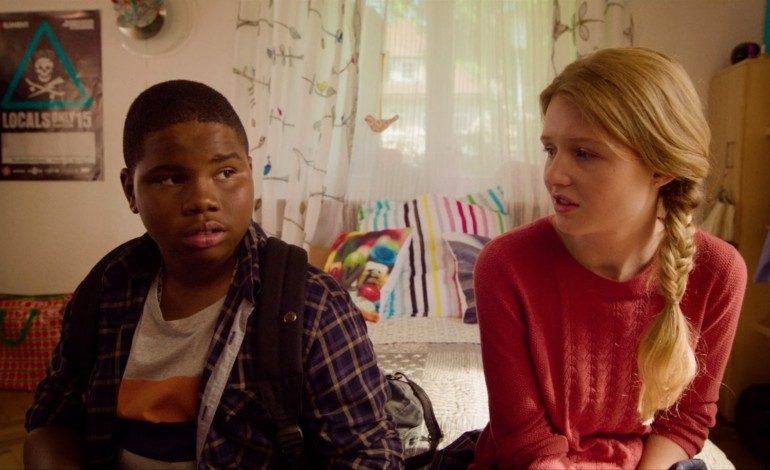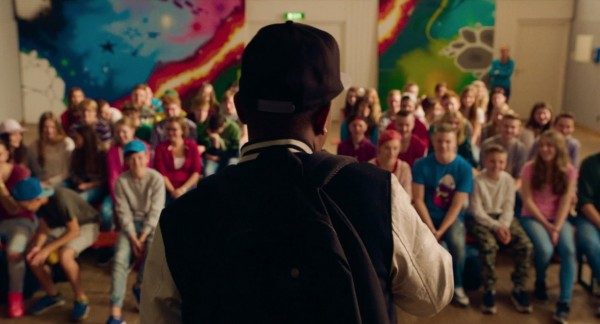

An outstanding blend of American hip-hop, wild German youth, and coming-of-age goodness, Chad Hartigan’s Morris from America is a cultural and cinematic treat. What could be seen as this year’s spiritual follow-up to Rick Famuyiwa’s Dope, Morris is precisely what the future of independent film looks like. Hartigan’s film asks the audience to look at adolescence and culture in new ways while managing to keep his themes universal, resulting in a truly unique and exciting film.
In his dynamic breakout, Markees Christmas plays Morris Gentry, a thirteen-year-old kid (and aspiring rapper) recently arrived in Germany with his father Curtis (Craig Robinson) who decided to move there from New York for a job. Spending his days going to private German tutoring sessions and exploring on his own, Curtis is having a difficult time socializing or fitting in until he meets the beautiful older Katrin (Lina Keller) at the local youth center. Katrin takes Morris under her wing and with her he experiences fully blown European youth – partying, drinking, drugs, and techno – as well as an intense crush and a fittingly awkward sexual awakening.
For many thirteen-year-old boys, this is the ultimate story of wish fulfillment, with Katrin serving as the enigmatic manic pixie dream girl. With little to no effort (aside from maybe him being the only American around) Morris is able to draw Katrin’s attention. She is everything a straight teenage boy could want in a girl: cool, mysterious, older (she’s 15), gorgeous, and she just happens to save all of her best flirting for him. But it isn’t as though Katrin doesn’t get anything out of their new friendship. Morris is like a shiny new toy for her, and the fact that their relationship bothers her mother doesn’t hurt either.
Aside from the reach taken to establish this relationship, Hartigan’s writing and storytelling is spot on. By placing two black Americans in the middle of a homogeneously white and foreign country, he creates the ultimate culture clash and puts a spotlight on black America in a new and interesting way. Hartigan’s direct approach is through hip-hop culture. Not only does Morris’ rapping elude and offend some of his new neighbors, but also his own father who grew up on the likes of Biggie and Tupac – artists that Morris seems to have no interest in. Culture clash transitions effortlessly into a generation gap so that Morris not only feels alienated by this new culture but also at times within his own home.
Morris’ relationship with his father, however, is something that makes this coming-of-age tale truly unique. In many (or most) teenagers-gone-wild narratives we see absentee or missing parents opening a space for the youth to freely experiment and explore life’s boundaries. Morris has Curtis, however, and Curtis is more or less a great parent. The pair have an entertaining and witty rapport, carried off hysterically by Robinson with infectious charm, and are a delight to watch together onscreen. Their generational divide also adds different perspectives to the cultural divide, keeping both father and son in check within their new environment.
Hartigan’s visual atmosphere is also influenced by the difference in cultures, particularly their music. In an impressive artistic feat, Hartigan marries his soundtrack beautifully with his plot and stylistic palette. For much of the film, Morris sees the world through a music filter – when he walks through the city’s historical sites, the inanimate sculptures as well as the foreign populace come to new life through the beats of his favorite hip-hop tracks, and when he hears Katrin’s techno for the first time, the fountain moves in syncopated technicolor rhythm to the music. Morris is the meeting place for this cultural fusion, making his foremost challenge to find himself within the mix.
Verdict: 4 out of 5
Morris from America is gratifyingly entertaining and is an exemplary representation of universal youth told through the wholly individual and distinct experience of its protagonist. With a plucky, spirited, and talented young cast, Hartigan’s film does the coming-of-age genre proud while adding fresh and varying perspectives to the table. The film does falter slightly, erring on the side of the dream girl trope, however, it regains its bearings through its strong father-son relationship and the smart blending of culture and generations.



